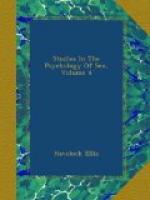Vision is the main channel by which man receives his impressions. To a large extent it has slowly superseded all the other senses. Its range is practically infinite; it brings before us remote worlds, it enables us to understand the minute details of our own structure. While apt for the most abstract or the most intimate uses, its intermediate range is of universal service. It furnishes the basis on which a number of arts make their appeal to us, and, while thus the most aesthetic of the senses, it is the sense on which we chiefly rely in exercising the animal function of nutrition. It is not surprising, therefore, that from the point of view of sexual selection vision should be the supreme sense, and that the love-thoughts of men have always been a perpetual meditation of beauty.
It would be out of place here to discuss comparatively the origins of our ideas of beauty. That is a question which belongs to aesthetics, not to sexual psychology, and it is a question on which aestheticians are not altogether in agreement. We need not even be concerned to make any definite assertion on the question whether our ideas of sexual beauty have developed under the influence of more general and fundamental laws, or whether sexual ideals themselves underlie our more general conceptions of beauty. Practically, so far as man and his immediate ancestors are concerned, the sexual and the extra-sexual factors of beauty have been interwoven from the first. The sexually beautiful object must have appealed to fundamental physiological aptitudes of reaction; the generally beautiful object must have shared in the thrill which the specifically sexual object imparted. There has been an inevitable action and reaction throughout. Just as we found that the sexual and the non-sexual influences of agreeable odors throughout nature are inextricably mingled, so it is with the motives that make an object beautiful to our eyes.[131]
The sexual element in the constitution of beauty is well recognized even by those writers who concern themselves exclusively with the aesthetic conception of beauty or with its relation to culture. It is enough to quote two or three testimonies on this point. “The whole sentimental side of our aesthetic sensibility,” remarks Santayana, “—without which it would be perceptive and mathematical rather than aesthetic,—is due to our sexual organization remotely stirred.... If anyone were desirous to produce a being with a great susceptibility to beauty, he could not invent an instrument better designed for that object than sex. Individuals that need not unite for the birth and rearing of each generation might retain a savage independence. For them it would not be necessary that any vision should fascinate, or that any languor should soften, the prying cruelty of the eye. But sex endows the individual with a dumb and powerful instinct, which carries his body and soul continually toward another; makes it one of the dearest enjoyments of his life




